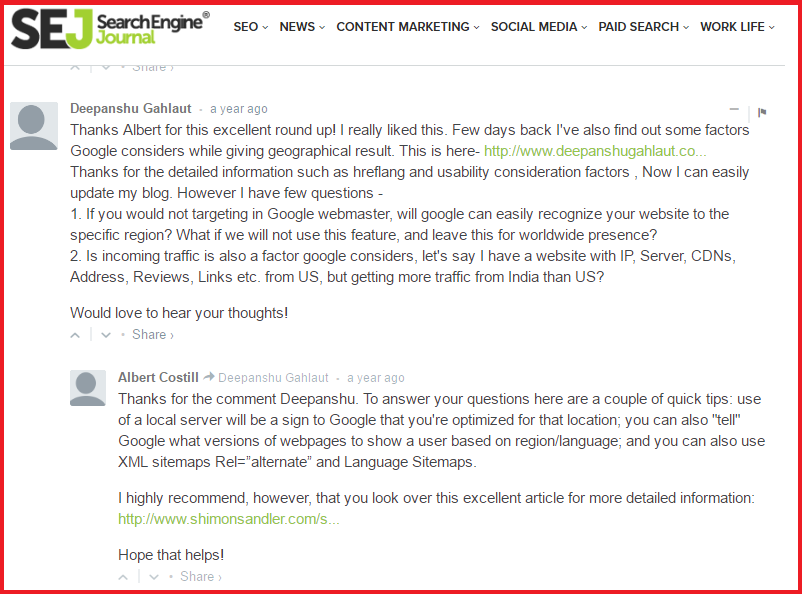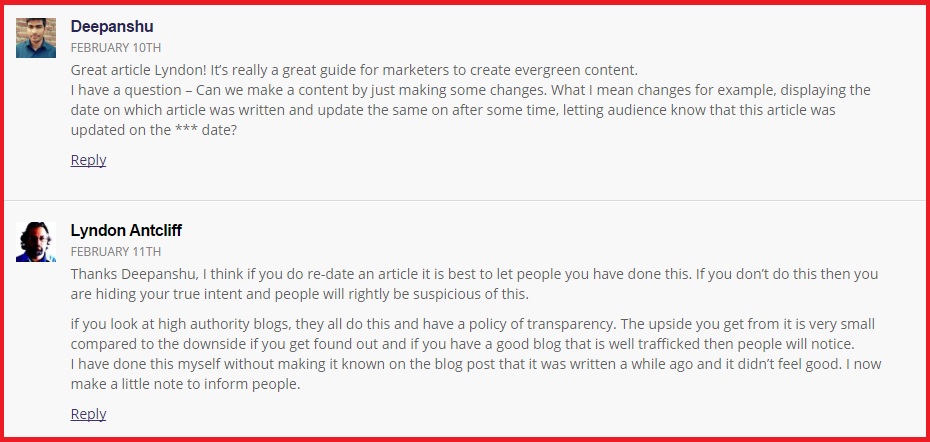Blog commenting is one of the mostly used link building techniques that many of SEOs, bloggers, and marketing professionals use to build their online reputation. However, there has been a significant decrease in popularity of blog comments in the past couple of years due to increased spam and low-quality user generated content.
Many websites have started removing comments completely or pushed the conversation to the social media communities.
Amidst all the chatter of blog commenting is not a good link building strategy for a reader/link builder or for a publisher, we actually have forgotten the fundamentals. Blog commenting is still a valid technique for link building, two-way communication, and building relationships.
So, what makes this a good link building tactic?
Let’s get to the basics. Here, I’m sharing some of the best practices that I’ve learned about commenting over the last few years and how you can use them in your link building strategy.
What is Blog Commenting in SEO?
Blog commenting is an action taken by a reader by leaving words of appreciation, questions, additional information or words that show their disagreement.
Why is Blog Commenting Important?
There are many reasons why you should be using blog commenting as one of your marketing tactics:
- Drive Traffic – Blog commenting brings direct traffic to your website. If the blog comment is intelligent, meaningful, and add something to the conversation, it’s likely that visitors will click on your site. This can turn into an important referral traffic source for your website.
- SEO – Most blog comments are no-follow links which actually have hidden powers like do-follow links. They provide you traffic, exposure, brand awareness and even can lead to earn you the do-follow links. There are also chances that the blog author can edit his/her post to include that link if it adds some value or additional information to the blog post.Also, if Google sees that if there is a healthy and relevant conversation, it can provide the site the ranking benefits. Recently, Google has pulled out the content from comment section in their featured snippet for “how much is gap insurance” query.

- Relationship Building – Blog commenting is more than just link building. It helps you create and make contacts, relationship with the like-minded bloggers and authors. Also, leaving comments on the blog helps make you more influential on that topic. When you consistently make comments on the blog, you build a relationship that may grow and lead to the business opportunities – partnership, referral or even guest posting opportunities.
- Better Branding – Blog commenting help you create better awareness about your brand by leveraging products and services in the blog comment. For example, there may be some comments that have not being answered by the blog author or other commenters. You can use this as an opportunity to answer that question and build awareness for your brand and attain expert status.
- Expand Your Knowledge and Authority: Blog commenting is a proven method of getting expert status on the subject. It’s an opportunity to help others with the topic, share experience and discuss with other like-minded and subject experts. That helps you expand your knowledge and build a social web presence.
Things to Consider When Commenting on a Blog:
Here are few best practices that will guide you how to do blog commenting and get results.
- The first rule is not to SPAM!

- Always choose a relevant blog post to comment on. For example, if your website sells sports shoes, a sports magazine or sports related article would be relevant.
- Read the blog post thoroughly and understand the author and his/her writing style. You can also read other blogs on the same topic to understand it.
- Read previously posted comments. Can you help someone by adding or replying to their comments?
- Make sure to use an authentic identity – your social media channels or a Gravatar account.
- Never use keywords as your name to comment on the blog post. Use your real name and identity.
- Write a minimum of 6 or 7 concise and compelling lines. Actually, it’s up to you – what you are adding to the conversation. Your point may be short or long.
- Always be helpful, authentic and honest while writing blog comments. You can thank him/her, agree or disagree with the author’s view.

- Use Website field to the link your homepage. If you are trying to get a link from within content, It’s best practice to link to the relevant page such as a blog post.
- Never drop a pure keyword rich text link in the blog comment that can have a negative impact on your site.
- Always reply to the comments. This can help you earn the trust of the publisher and build your authority as a subject matter expert.
- It’s a good practice to share your comment on social media. Every publisher loves their blogs to be shared on social media and you are helping them out.
- Consistency is the key. Commenting daily, weekly or bi-weekly can help you earn the trust of the publisher, plus, it helps you attain expert status.
- Make sure to monitor the result of blog commenting. The number of replies, approved links, incoming traffic, page views are the metrics you should track in Google analytics to measure the success of blog commenting.
What Makes a Comment “BEST and Relevant”?
So what counts as a high-quality comment?
A high-quality comment consists of EAT (Expertise, Authoritativeness, and Trustworthiness), brings useful information and may have the higher value in addition to the content that you’ve provided on that page.
Below are some questions that you should ask to assess the “quality” of blog comment:
- Are you adding a value to the blog post?
- Would author trust you and your content?
- Does your comment have spammy links or duplicate content?
- How much relevant your comment is?
- Is the comment written by an expert or enthusiast who knows the subject or topic well?
Here is an example:
How to Find Relevant Blogs to Comment on?
This is one of the important as well as difficult task to find the right blogs to comment on. Try to find blogs that are in your niche. Here is a handy list of tools that can help you find relevant blogs for commenting.
- Google Search
- BuzzSumo
- Right Relevance
- Google Alerts
- Moz Content
- Google News
- Hashtags to search on social media
- Advanced search operators to search on Google such “Leave a Reply” + Keyword
No matter why you are blog commenting, make sure you are doing it right and end up improving your online reputation, authority and search engine optimization.
Don’t just believe that all blog comments are bad. Some are really amazing and incredibly helpful for both search engines and users.
What commenting tips have helped you in your SEO rankings or online social influence? Please share in comments.





 Only Homepage Returning 404, How to Fix and Make it 200 (OK)
Only Homepage Returning 404, How to Fix and Make it 200 (OK)
Hi Deepanshu, great article, thanks for sharing your experience!
I believe that in addition to the instructions you have provided for blog commenting the anchor text to use should be branded anchors and as you rightly said the focus should be on building authority and relevance.
Deepanshu thanks a lot for this post! Unfortunately, I don’t have anything to add as a “value” to your article, but only because I agree with every word of it 🙂 Keep up the good work. You just got a new reader 😉
Hi Deepanshu, one important aspect of blog commenting that people often end up abusing is the anchor text. Most of the times I have seem people use keyword rich anchor texts – this leads to either the blog comment being rejected by the webmaster or leads to an over-optimization penalty. I believe that in addition to the instructions you have provided for blog commenting the anchor text to use should be branded anchors and as you rightly said the focus should be on building authority and relevance.
nice reply
Nice Article!very informative
Hii deepanshu.
Nice information shared about blog commenting,Great tactics to follow.
Having read this I thought it was very enlightening. I appreciate you spending some
time and energy to put this informative article
together. I once again find myself spending way too much time both reading and
posting comments. But so what, it was still worthwhile!
Deepanshu ,
What about fake commenting that seems to have become a trend just to get some backlinks? SEO if done methodically is a great strategy for getting qualified leads via organic search results, but if the market continues to be invaded by fake SEO self proclaimed experts that just submit comments like “nice reply” with a link back to their website, then whether you do commenting or blogging or anything objective, it becomes pointless.
Excellent explanation about SEO blog commenting
One of the Best Practices for the Search engine optimization beginner.